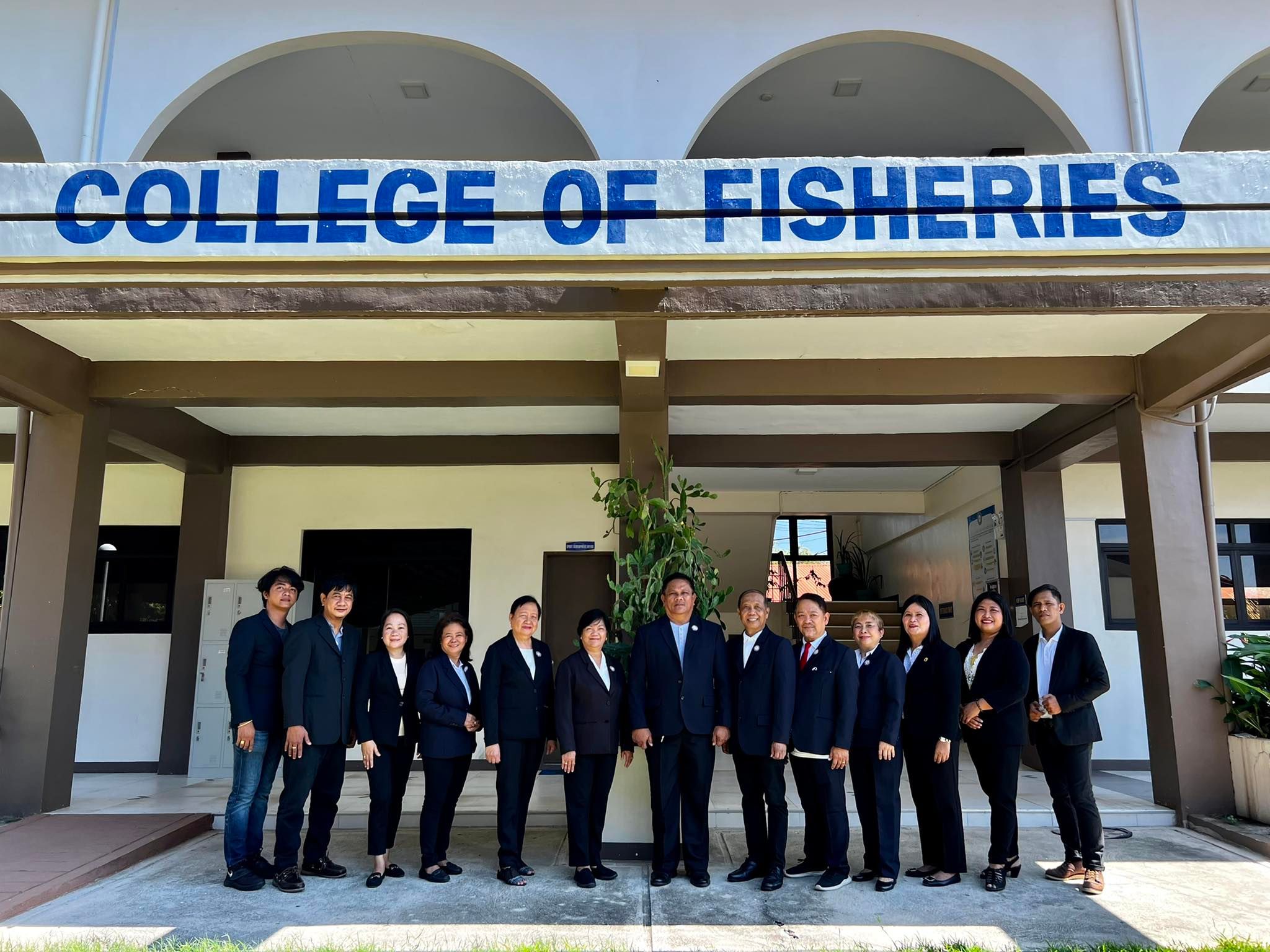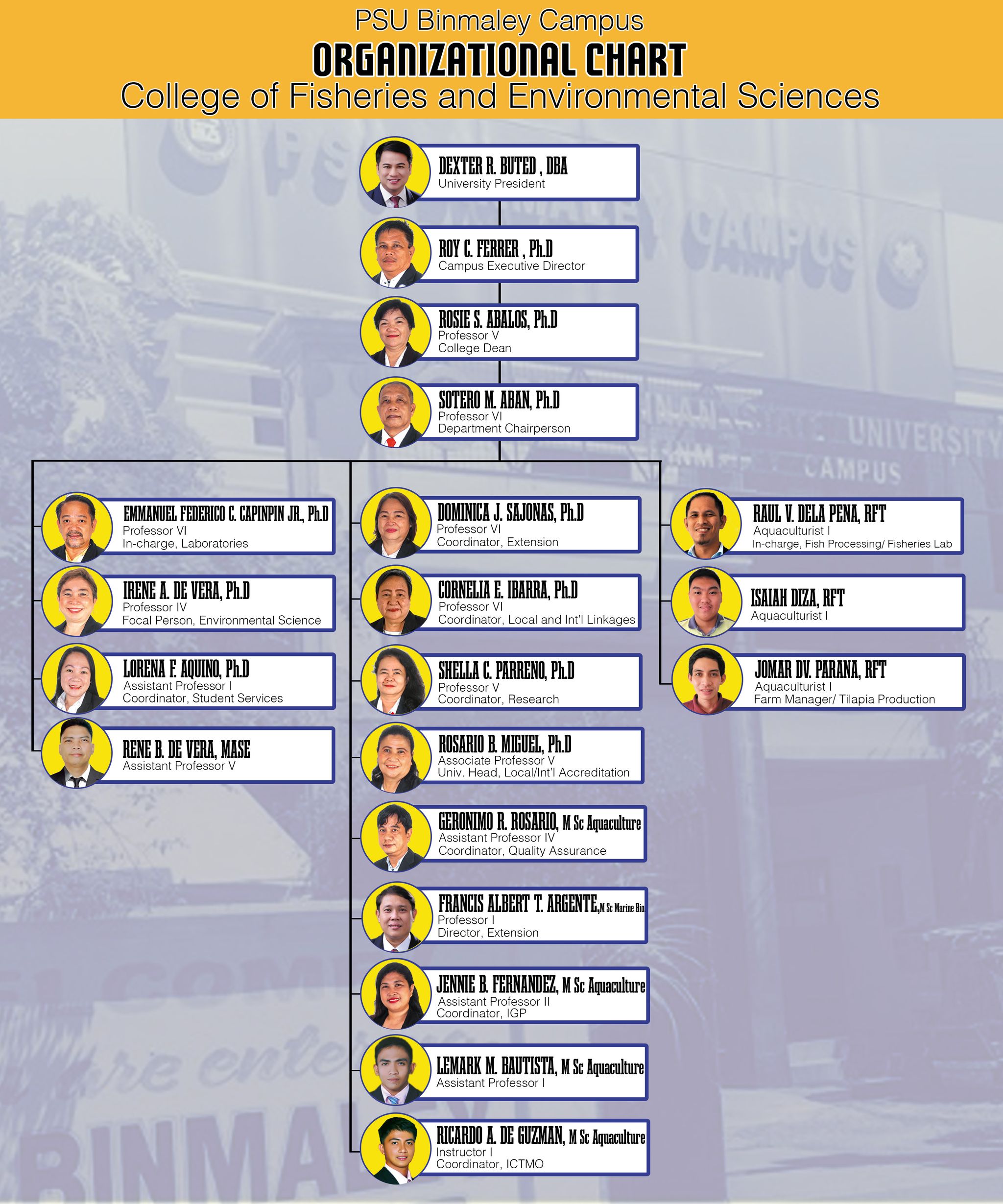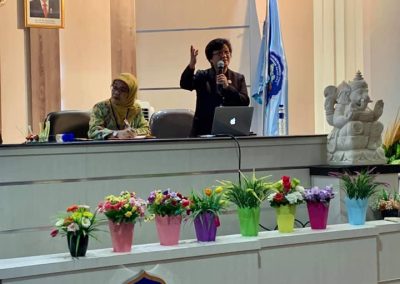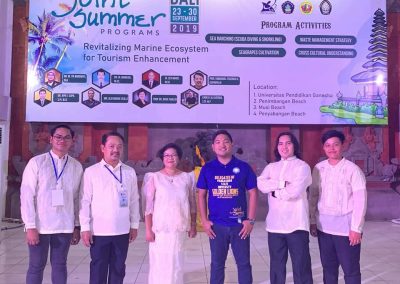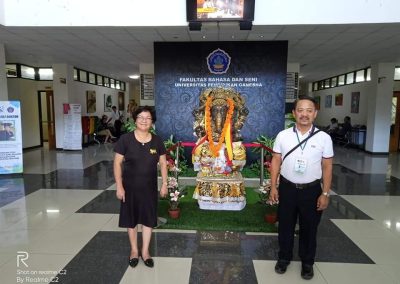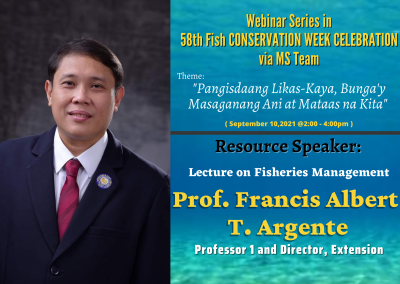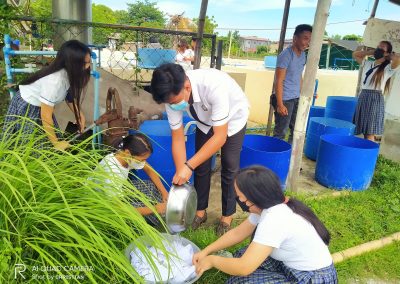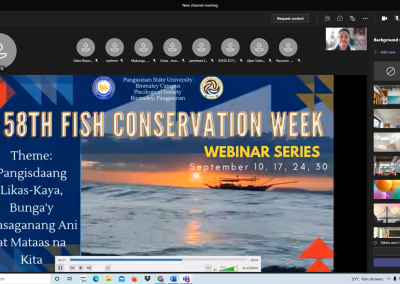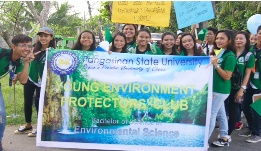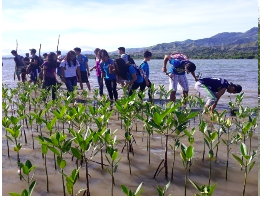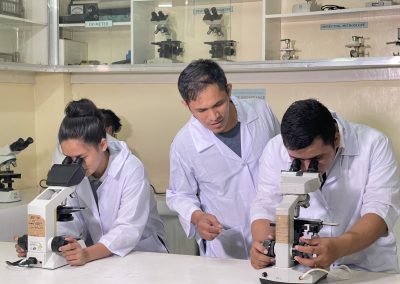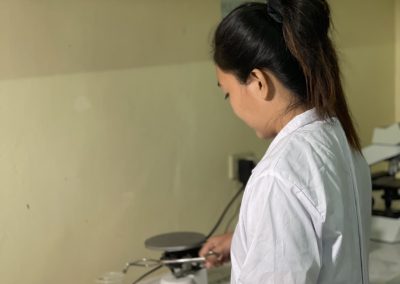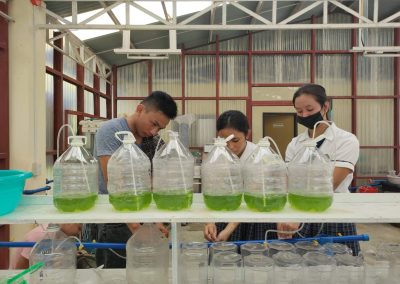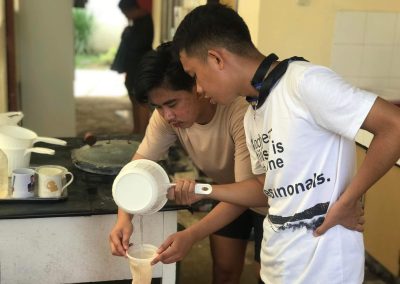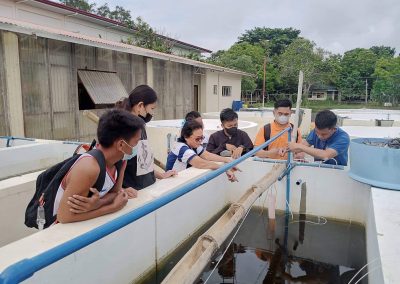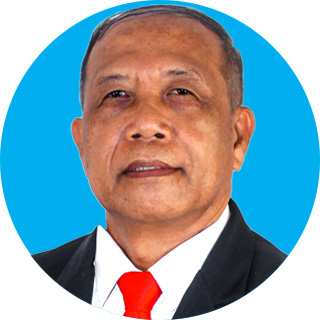
Sotero M. Aban, Ph. D.
Chair, College of Fisheries and Environmental Sciences
Greetings from the College of Fisheries and Environmental Sciences!
Welcome to the College of Fisheries and Environmental Sciences of the Pangasinan State University, Binmaley Campus: the Center of Excellence (COE) in Fisheries in Region 1, awarded by the Commission of Higher Education (CHED) of the Philippines; the home of board topnotchers in the Licensure Examination of Fisheries Technologists; the home of full-fledged professors in Fisheries and Environmental Sciences; and the Regional Center for Milkfish Research and Development, awarded by the Regional Development Council of the National Economic Development Authority (NEDA).
The College continuously produces professionals in Bachelor of Science in Fisheries and Bachelor of Science in Environmental Science who have all the competencies, knowledge, skills, and positive attitudes to support national, regional, and local development plans.
The College also establishes linkage with local, national, and international agencies and other institutions for partnership in areas of instruction, research, cultural exchange, and other academic partnerships. Through these linkages, students are given opportunities for national and international exposure and experiences.
The College of Fisheries and Environmental Sciences extends its full support to the Pangasinan State University (PSU) System for its application for QS (QS) Stars Accreditation. This is one way of promoting the academic and research programs of PSU to the International Community.
Bachelor of Science in Fisheries
The Bachelor of Science in Fisheries (BSFi) is the flagship program of the Pangasinan State University, Binmaley Campus. The BS Fisheries curriculum offered is compliant with CHED Memorandum Order No. 43, series 2006 – the Policies and Standards for the Bachelor of Science in Fisheries (BSFi) Program. Based on CMO 43, series 2006, the BSFi program has no major, and graduates are intended to be knowledgeable in all aspects of fisheries, namely: Aquaculture, Capture Fisheries, Post-Harvest Fisheries, and Aquatic Ecology and Resources.
The BS Fisheries (BSFi) curriculum is designed to prepare well-rounded fisheries professionals with competencies in the principles and practice of fisheries science The curriculum is made up of five components; 1) General Education courses (39 units) 2) Foundation courses (26 units), 3) Professional courses (76 units), 4) Electives (18 units), 5) Other Required Courses (14 units).
Further, the BSFi curriculum provides knowledge to students as required in the 1998 Philippine Fisheries Code (RA 8550) for proper fisheries and environmental management and sustainable/responsible fisheries, and in the recently approved duties and competencies of fisheries professionals. It also enhances the chances of graduates to pass the fisheries professional licensure examination for the Professional Regulation Commission.
The BS Fisheries program is now implementing Outcome-Based Education which is relevant to the offering of the K+12 Program of the Department of Education (DepEd).
Bachelor of Science in Environmental Science
The BS in Environmental Science program covers a broad scale of environmental concerns. It seeks to study the interactions between the environment and human society using the tools of science in an interdisciplinary way. Its primary objective is to use the various sciences in the study of the environment. Thus it employs the scientific method as its principal framework, and applies whichever science is needed to the study of the environment. Environmental science also recognizes the critical role of human society in the environment; hence it lays the groundwork for the effective management of the environment.
Accreditation
| Bachelor of Science in Fisheries | Level IV Re-accredited |
| Bachelor of Science in Environmental Science | Level II Re-accredited |
Employment Opportunities
Bachelor of Science in Fisheries
- Fisheries Resource Management
- Fisheries Research
-
Fisheries Extension Service
- Fisheries Entrepreneurship
- Fisheries Industry Management
- Fisheries Education
- Fisheries Nutrition
- Fisheries Biotechnology
The present employment of BS Fisheries at the College of Fisheries and Environmental Science includes the following:
1. State Colleges and Universities (SCUs). The BSF Graduates who are employed in SUCs like the Pangasinan State University (PangSU), Pampanga State Agricultural University (PSAU), Aurora State College of Technology (ASCOT), President Ramon Magsaysay Memorial State University (PRMMSU), Bataan Peninsula State University (BPSU) hold academic ranks ranging from Instructor I to III, Assistant Professor I to IV, Associate Professor I to V and Professor I to VI. Some are designated as Directors, College Deans, Department Chairpersons, Coordinators, Research Center Heads, and many others.
- Bureau of Fisheries and Aquatic Resources (BFAR) of the Department of Agriculture (DA). The BSF graduates are employed in BFAR Region 1, BFAR Region II, BFAR Region III, BFAR Cordillera Administrative Region, BFAR-National Integrated Fisheries Technology Development Center, BFAR National Freshwater Fisheries Technology Center, BFAR Region 4, BFAR Regional Marine Technology Development Center, etc. as Aqualturist I, Aquaculturist II, Senior Aquaculturist, Fishery Regulation Officer, Aquaculture Technologist, Hatchery Technician, Aquaculture Technician, National Stock Assessment Program (NSAP) Researcher and Enumerator, Center Chief, and Unit Head.
- Provincial Government and Local Government Units (LGUs) as Provincial Fisheries Unit Head, Municipal Agricultural Officer, Municipal Planning Officer, Agricultural Technologist, Aquaculture Technologist,
- Feed Companies. The BSF graduates are also employed in feed companies like the Charoen Pokphand Philippines, Cargill Philippines, Feedmix Specialist, Santeh Feeds, Uno Feeds Robina, B-Meg Feeds, etc, as Feed Sales Representative, Aquaculture Technician.
5. Some BS Fisheries graduates are employed as entrepreneurs in the area of fish processing or fishery product development, milkfish cage farming, seed fish production (like Tilapia fish hatchery) and some other business related to fisheries and aquaculture.
Bachelor of Science in Environmental Science
The Graduates of BS Environmental Science program can be employed at the entry-level of science positions. They can engage in work related to air, soil and water quality management, energy and resource management, planning and design, waste management and environmental assessment. In particular, they can work as environmental impact assessors, environmental officers, conservation and resource management staff, project planning and assessment and program/project/technical personnel in private companies, non-government organizations and government agencies.
The Bachelor of Science in Environmental Science, being a multidisciplinary field, is allied to a number of fields in the biological sciences, earth sciences, physical and social sciences. It also relates with mathematics, particularly in modeling and statistics. It is also allied to many fields particularly in agriculture, fisheries, forestry, energy and resource management, information systems, environmental design and planning, and environmental engineering and sanitation.
- Program Objectives (BS Fisheries)
- Program Outcomes (BS Fisheries)
- Program Objectives (BSES)
- Program Outcomes (BSES)
BACHELOR OF SCIENCE IN FISHERIES
The program goals are to produce the following:
- Globally competitive graduates in the areas of sustainable aquaculture, capture fisheries, post-harvest and aquatic resources and ecology;
- Fisheries professionals imbued with high level of integrity, nationalism and ethical standards;
- Leaders in their profession and respective communities; and
- Professionals with knowledge, skills and positive attitudes in fisheries research, resource management, instruction, extension, production and marketing.
The minimum standards for the BS Fisheries and Program are expressed in the following set of learning outcomes
Institutional Learning Outcomes (ILO)
Demonstrate through institutional mechanisms, systems, policies and processes which are reflective of transparency, equity, participatory decision making, and accountability.
Engage in relevant, comprehensive and sustainable development initiatives through multiple perspectives in decisions and actions that build personal and professional credibility and integrity;
Set challenging goals and tasks with determination and sense of urgency which provide continuous improvement and producing quality outputs leading to inclusive growth;
Exhibit life-long learning and global competency proficiency in communication skills, inter/intrapersonal skills, entrepreneurial skills, innovative mindset, research and production initiatives and capability in meeting the industry requirements of local, ASEAN and international human capital market through relevant and comprehensive programs;
Display, socially and environmentally responsive organizational culture, which ensures higher productivity among the university constituents and elevate the welfare of the multi-sectoral communities, and;
Practice spiritual values and morality upright behaviour which promote and inspire greater harmony to project a credible public image.
Common to All Programs in All Types of School (CTS)
Articulate and discuss the latest developments in the specific field of practice (PQF Level 6 Descriptor).
Effectively communicate orally and in writing using Mother Tongue, English and Filipino.
Work effectively and independently in multi-disciplinary and multi-cultural teams (PQF Level 6 Descriptor).
Act in recognition of professional, social, and ethical responsibility.
Preserve and promote “Filipino historical and cultural heritage” (based on RA 7722).
Common to the Discipline (CD)
Generate and share knowledge relevant to fisheries education.
Formulate and implement fisheries development/management plans and programs.
Specific to a Sub-Discipline and a Major (SDM)
Develop, operate and manage aquaculture production systems.
Utilize fisheries resources using innovative fishing methods which are responsible and sustainable.
Apply post-harvest practices that are complaint to international standards for food safety and quality.
Manage and protect the integrity and quality of aquatic ecosystems and resources.
Common to Graduates of a Horizontal Type of Institution as Defined in CMO 46, s.2012 (CHT)
Ability to participate in the generation of new knowledge or in research and development projects.
BACHELOR OF SCIENCE IN ENVIRONMENTAL SCIENCE
The BS Environmental Science aims to produce graduates equipped with multidisciplinary and integrated tools and approaches; perspectives and values related to environmental problems and concerns.
The minimum standards for the Bachelor of Science in Environmental Science program are expressed in the following minimum set of learning outcomes:
Common to all baccalaureate programs in all types of institutions
– articulate the latest developments in their specific field of practice. (PQF level 6 descriptor)
– effectively communicate orally and in writing using both English and Filipino languages.
– work effectively and independently in multi-disciplinary and multicultural teams. (PQF level 6 descriptor)
– demonstrate professional, social, and ethical responsibility, especially in practicing intellectual property rights and sustainable development.
– preserve and promote “Filipino historical and cultural heritage”. (based on RA 7722)
Common to the Science and Mathematics Disciplines
– Demonstrate broad and coherent knowledge and understanding in the core areas of physical and natural sciences.
– Apply critical and problem solving skills using the scientific method.
– Interpret relevant scientific data and make judgments that include reflection on relevant scientific and ethical issues.
– Carry out basic mathematical and statistical computations and use appropriate technologies in (a) the analysis of data; and (b) in pattern recognition, generalization, abstraction, critical analysis and problem solving.
– Communicate information, ideas problems and solutions, both, orally and in writing, to other scientists, decision makers and the public.
– Relate science and mathematics to the other disciplines.
– Design and perform safe and responsible techniques and procedures in laboratory or field practices.
– Critically evaluate input from others.
– Appreciate the limitations and implications of science in everyday life.
– Commit to the integrity of data
Specific to Bachelor of Science in Environmental Science
– demonstrate broad and coherent knowledge and understanding in the core areas of environmental science;
– disseminate effectively knowledge pertaining to sound environmental protection, conservation, utilization and management;
– demonstrate the ability to contribute to the protection and management of the environment; and
– analyze local environmental issues and problems in the regional and global context.
– apply appropriate knowledge and innovation related to the environment;
Common to a horizontal type as defined in CMO No. 46, s. 2012
– To promote service in one‟s profession
– To participate in various types of employment, development activities, and public discourses particularly in response to the needs of the community one serves
– To participate in the generation of new knowledge or in research and development projects

